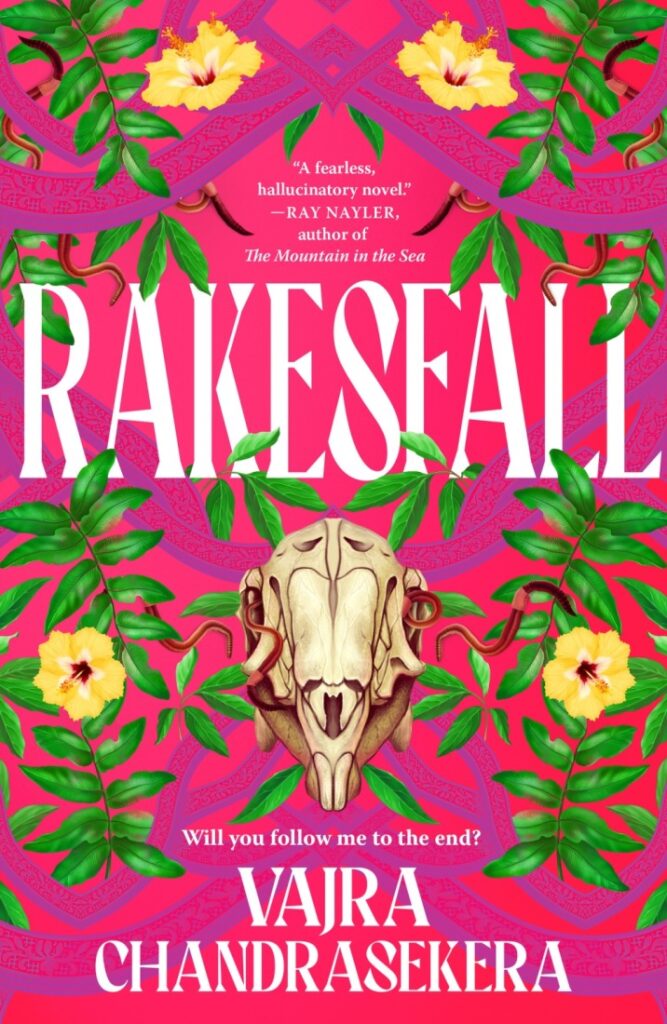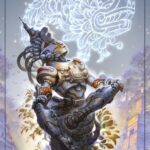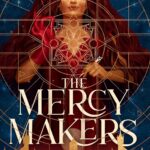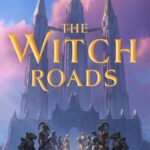
Genres: Adult, Queer Protagonists, Sci Fi, Science Fantasy
Representation: QBIPOC cast
Published on: 18th June 2024
ISBN: 1250847699
Goodreads

Rakesfall is a groundbreaking, standalone science fiction epic about two souls bound together from here until the ends of time, from the author of The Saint of Bright Doors
Some stories take more than one lifetime to tell. There are wrongs that echo through the ages, friendships that outpace the claws of death, loves that leave their mark on civilization, and promises that nothing can break. This is one such story.
Annelid and Leveret met after the war, but before the peace. They found each other in a torn-up nation, peering through propaganda to grasp a deeper truth. And in a demon-haunted wood, another act of violence linked them and propelled their souls on a journey throughout the ages. No world can hold them, no life can bind them, and they'll never leave each other behind. But their journey will not be easy. In every lifetime, oppressors narrow the walls of possibility, shaping reality to fit their own needs. And behind the walls of history, the witches of the red web swear that every throne will fall.
Tracing two souls through endless lifetimes, Rakesfall is a virtuosic exploration of what stories can be. As Annelid and Leveret reincarnate ever deeper into the future, they will chase the edge of human possibility, in a dark science fiction epic unlike anything you've read before.
I received this book for free from the publisher via NetGalley in exchange for an honest review. This does not affect my opinion of the book or the content of my review.
Highlights
~a handful of minutes
~hunt treasure, find demons
~time ain’t what it oughtta be
~the things one will do to get a son-in-law
~grandparents made of abnormal atoms
I’ll be honest: I don’t think I understood most of what was going on in Rakesfall.
But I loved every second of it.
In the simplest possible terms, it is, as the blurb claims, the…story…of two (at least two) souls as they reincarnate again and again. But describing it that way doesn’t even BEGIN to give you an idea of what Rakesfall is, or is like.
enormity cannot truly, fully be spoken of without recourse to fable. There is a dread scale at which only myth works; only nightmare has the technology. Worlds must be broken to convey that attempts to depict a multidimensionally unspeakable reality in fiction, including this one, are but contemptible in the final reading.
Part of it seems to take place in the past of our world, and some in our present or near-present – but the vast majority of it, all the stories that are really one story, are taking part in a world that isn’t ours, and then in a future that could be, but could just as easily be the future of this world that isn’t ours. (Readers familiar with Chandrasekera’s debut, The Saint of Bright Doors, will recognise the city of Luriat, which we visit again this book – albeit relatively briefly.
Does that make Rakesfall the/a sequel to The Saint of Bright Doors? I don’t think so, but some of the terms used in TSoBD come up again in Rakesfall, so it is helpful to have read TSoBD first. Very not-mandatory, though.)
Possibly this is the meaning of the title – The Rakesfall, if I understood it correctly, was an event that…‘broke’ isn’t the right term…changed the timeline, and thus the world, into…not what it ‘shouldn’t’ be, but what it wasn’t before. So I think the setting(s are) meant to be…a world our world could have been, or might have been, or would be, if time hadn’t gone the way it did. And/or will be, re the future parts, if we don’t hurry up and eat the rich already.
I’M TRYING MY BEST, OKAY?
Georges does not ask himself why the Christian devil has hooves and horns, which is of course that they are satyrical.
There is wordplay and mindplay and a rapid cycling through perspectives, sometimes several perspectives of the same event or events. We jump from the colonialisation of Sri Lanka to the far-future when humanity has left Earth behind entirely, and a whole bunch of places – some real, some meant-to-be-real, some meant-to-not-be – in-between (and before, and after). I don’t think it’s accurate to say that there is one clear, linear story being played out over all these lifetimes and timelines (if there is, I missed it) but it would be equally untrue to claim that Rakesfall has no plot; each section of the book – most of which cover one lifetime or time-period – covers a series of events that I was very invested in, even when I knew I was missing some nuance or only comprehending a piece of the whole. There is a murder-mystery; there are many attempts to ‘regreen’ the Earth after climate collapse; there is identity-theft with souls; there are quests, kind of; there is subtle and unsubtle resistance to political oppression; there are ghosts being taken to court to stop their hauntings. There is a LOT.
It is difficult to stay in any one place, one world, one life. Each life is hard time, requiring painful incarnation, carceral enfleshment, the performativity of renaming and reliving, learning new histories, wilful forgettings and distancings, whatever is needed to maintain narrative continuity and protect genre boundaries.
But it is not a collection of short stories – not even a collection of interconnected short stories – nor is it a mess. Rakesfall is cohesive, though I’d forgive anyone for not seeing how it COULD be, after the description above. I said I didn’t see one obvious story that these smaller stories are all a part of, and that’s true, but they still share something fundamental; they still form a whole, even if the whole isn’t anything as simple as what (white, Western) readers are used to thinking of as a story. Stories have beginnings, middles, and ends; Rakesfall doesn’t, really, because for all its fantastical elements it is mimicking (echoing? copying? replicating? recreating?) reality, which is also made up of stories but does not form one big easy-to-read here’s-the-climax there’s-the-moral Story.
And for all that the individual stories don’t click together like puzzle pieces to make another, bigger story, the various parts – facets – incarnations of Rakesfall do fit together. Rakesfall is eat-the-rich anarchist, anti-facist, anti-capitalist, deeply concerned with the idea of the visible and invisible worlds, the latter of which is by turns a place of spirits and one of digitally uploaded personalities (and really, when you think about it, what’s the difference?) Exorcisms, conceptually, come up again and again, as does the theme of losing your skin, casting it off, getting it back, it being stolen, reclaiming it, the raw-red-primality that lies beneath it and must sometimes be bared (defiantly, joyfully, wrathfully). Quantum physics melts gleefully and purposefully with history, folklore, philosophy, religion without the religion.
Objects are not discrete. The perception of time is an illusion. Seeming biological realities are socially constructed: gender is only genre, race is a race to the bottom, species as arbitrary as specie. Seeming social realities are machinations of power hiding their inverse: slavery is called freedom to disguise its exploitation; ignorance is called strength, to champion political illiteracy; and most of all, most of all, war is called peace, the peace bought by murder, the peace of the unmarked grave.
I also think…possibly…that the reason all these parts, all these smaller stories, work together is because it’s like…it’s like watching two people go through life. Even though they are actually going through lives, it somehow doesn’t feel too different from watching how a person – ‘develops’ is the wrong word, it implies a set end-point that doesn’t exist when you’re talking about people/souls – throughout their life. You watch a single life for a lifetime, you see the person go forward, stumble, go forward, two steps back, now take a step to the right, forwards again, stumble again, always themselves but always changing, always different, too (unless they stagnate, and we all hope we never get caught in that trap). The two souls we follow through Rakesfall are like that – even if I wasn’t always sure which character in Part III or Part VI etc was which soul (because, of course, they change names and genders and their personalities are not identical in every life, why would they be, they are not replicas of their past-selves, they are them-selves) – even so, I think there’s a quiet, subtle sense that you are still following the same people, lifetime after lifetime. We’re seeing them in different contexts, different times, seeing them as they grow, as they stumble, as they take a step to the right…but they’re the same two souls. There’s something, something I can’t articulate, something that proves Chandrasekera is a genius (as if his debut didn’t prove that, as if every other aspect of Rakesfall doesn’t prove it), that makes me feel, ‘ah yes, it’s these two again’.
EVEN WHEN I DON’T KNOW WHICH IS WHICH.
WHAT CAN ONE CALL THAT BUT GENIUS???
Reincarnation is horizontal, and always plural: no person survives death, but all worlds live and die together, and lives echo like waves upon waves in the great akashic ocean because we choose to work together across time. We choose!
I can’t narrow down Rakesfall to just one thing; I can’t sum it up in a nice, pithy little quote with a bow on top. There are layers and layers of meaning here, a serpent with endless skins where each shed skin becomes a new snake that is itself but is the old snake too, repeating on and on in an infinite, dizzying, constantly-creating ouroboros. Except it’s not an ouroboros, because in an ouroboros the snake is eating its own tail and that’s not what’s happening here, the snake is not devouring itself, the snake is holding hands with all the other snakes born from its shed skins and that is how they form a circle, an endless chain across eternity all holding hands, all of them unique and all of them the same.
(Yes I said hands, I meant hands, don’t you see the impossibility is the point.)
The snake isn’t trying to eat itself; there are other people trying to eat the snake. And maybe the only black-and-white thing Chandrasekera has to say is that those people are bad.
Everything else is complicated as fuck. But the people trying to eat other people – that’s simple. That’s easy. They are the only ones who are truly monstrous, and the only ones who cannot be forgiven, and the only ones who must, must, be completely and utterly destroyed.
you speak of our innocence and ignorance, and you weren’t wrong about that. We have forgotten so much from the human eon. But we remember the parts that matter.
(The people trying to eat the snake are the CEOs and presidents and dictators and war-mongerers and I think you get the demographic I’m describing here.)
It’s funny; I have to reach for poetry and metaphor to describe Rakesfall, and one of Chandrasekera’s (many) points in it is how some concepts/truths/stories are too big, too much, too true for us mortals to begin to grasp without poetry and metaphor. (‘enormity cannot truly, fully be spoken of without recourse to fable’ is the first quote I quoted.) Which, following that reasoning, makes Rakesfall, too, something too big, too much, too true to comprehend fully without the…the protection, which is also the filter, of poetry.
Which. Yes. Yes it is.
Family legend had it that when Vidyucchika’s father was born, her nonbaryonic grandfather sighed to see the child’s traitor penis.
So one of my favourite things about reading with an e-reader is the built in dictionary. (I’m going somewhere with this, bear with me.) But because I read SFF, it’s not unheard of for a book to present me with a word my dictionary doesn’t know. Sometimes it’s a very specific niche thing, like a minor part of a ship built in the 1600s, or a very archaic term for a colour, something like that. And because this book is by Chandrasekera, I wasn’t surprised when it happened in Rakesfall.
Nonbaryonic, I said to myself. What does that mean??? To a search engine!
As you might guess, it means ‘not baryonic’. Okay, so what does baryonic mean?
I DON’T KNOW.
I MEAN, I KNOW THE DEFINITION
baryonic
adjectiveall objects made of normal atomic matter
BUT IN NO WAY DOES THAT HELP ME. Vidyucchika has a baryonic set of grandparents and a nonbaryonic set of grandparents and I don’t understand
But I fucking LOVE IT
Because seriously, how cool is that concept? GRANDPARENTS…NOT MADE OF NORMAL ATOMIC MATTER??? SO WHAT ARE THEY??? I don’t know! I have pieced together some things that happen so I kind of understand, or think I do, some of the practical effects of having nonbaryonic grandparents, what having them allows to happen in the story – but I don’t really understand what the grandparents are.
And I don’t feel patronized, I don’t feel like Chandrasekera is showing off or trying to make me feel stupid or anything of the kind. For one thing, I feel honoured that Chandrasekera thinks I have a chance of keeping up with him as he tells this story, and that makes me work harder, focus harder, trying to understand as much of it as I can. But ultimately, I think Chandrasekera is just light-years ahead of the rest of us; he is on another level so far from mine, from anyone else’s, that my elevator doesn’t even have a button for it. I don’t know what is going on in his head, but I am mesmerised, I am entranced, I am loving every second of it.
I understand enough to appreciate what I don’t understand.
Time elapses, or does not lapse. Time elongates; time elopes; time lopes like a leopard that is not a leopard.
Obviously, this is not a book I’d recommend for readers who need to understand everything, who must have all the answers by the final page. There’s nothing wrong with that whatsoever, it just means that Rakesfall isn’t for you. (Although who knows; maybe if you give it a try, you’ll get a taste for books that leave you flailing in bedazzled bewilderment. Weirder things have happened.
Weirder things have happened IN THIS BOOK.)
Who is it for? Anyone who wants to be challenged. Anyone who likes the sensation of their mind stretching to accommodate new knowledge, new ways of thinking, just newness. Anyone whose heart beats faster when you come across a SFF story that really is like nothing else you’ve ever read (or watched, or heard) before. Anyone who craves layers and layers of thought and myth and meaning in their fiction, who wants to sink their teeth into a Rôti sans pareil of a book and feel it bite back.
Anyone who is happy to be light-years behind, and wants to chase the comet anyway, even if you might not ever catch it.
Rakesfall is phenomenal. It’s a masterpiece of mindfuckery and spirituality, a manifestation of exquisitely incomprehensible imagination and undiluted emotion, a manifesto of anarchism and akashic freedoms and the wryly joyful impossibility of writing the mythic, at which one can never truly succeed but where the meaning lies in the trying. It’s a thought experiment and an argument and a case study, a high-speed race through the spheres, a merciless dissection of the laws and powers mundane and metaphysical, and all of it brutal and beautiful and breathtaking.
It is, in a word, unmissable.







Yes, a baryonic bug has certainly bitten, and a resulting non baryonic enfolds!
Love this review, it conveys what Vajras writing can conjure in a reader.
Ross
Thank you so much! That’s such a wonderful compliment :D Glad you enjoyed the review!
Thanks for the suggestion! I hope I will be able to write 1/100th as well as he does
You’re very welcome! And I hope so too – we need all the amazing storytellers!